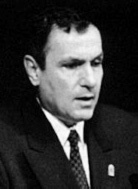|
Spring 1998 (6.1)
Hillary Rodham Clinton, wife of U.S. President Bill Clinton, speaking in Ukraine in November 1997 on her tour to some of the former Soviet Republics-Kazakhstan, Kyrgyzstan, Uzbekistan, Russia and Ukraine. Assassination Attempt
Won't Destroy Freedom Georgian President Eduard
Shevardnadze, 70, on February 10, 1998, after surviving the second
attempt on his life in 30 months. He attributed the assassination
attempt to a "third force" of "international terrorism"
in Russia. The highly organized attack with rocket-propelled
grenades injured two body guards in his motorcade and killed
another, Kakha Shevardenidze, 37, who was credited with having
saved the President's life in 1995. Levon Ter-Petrossian, former Armenian President in his resignation speech in Yerevan on February 5, 1998, referring to accusations from hard-liners and members of the opposition, including Robert Korcharian [former "President" of the self-proclaimed, so-called "Republic of Nagorno-Karabakh," who was elected President of Armenia on March 31, 1998]. Ter-Petrossian was accused
of being conciliatory towards Azerbaijan in resolving the Karabakh
conflict. In November 1997, he said publicly, "We must be
realistic and understand that the international community will
not tolerate for long the situation created around Nagorno-Karabakh,
because it is threatening regional cooperation and security as
well as the West's interests in oil. I was schooled in the theory of journalism during the Soviet period, but my real initiation came while reporting about Azerbaijan's quest for national independence-at the demonstrations at Azadlig Square [1988-1990], in the bloody streets of Baku during Black January [1990], at the front-line with soldiers in the Karabakh war [1992-1994]. I have personally witnessed the most critical moments in contemporary history in our struggle for independence." Elmira Amrahqizi, 47, one
of the most respected journalists in Azerbaijan, helped shape
the new independent press since the collapse of the Soviet Union.
She worked tirelessly as a daily news correspondent in Azeri
with Radio Liberty (Prague) and was Azerbaijan International's
correspondent in Baku. She often traveled internationally with
President Aliyev's press team. Elmira tragically passed away
in the prime of her career in March 1998, of cancer. She was
buried in Baku's "Fakhri Khiyabani" (Cemetery of the
Honored Ones) where personalities who have made the greatest
contribution to the nation-artists, writers, musicians, academicians
and government leaders-are memorialized. I'm old now but if I had the chance to live my life all over again, I would do the same thing despite the hardships, the cold, hunger and abuse that I have had to endure. Through it all, I never lost my pride or dignity as an Azerbaijani." Ismahan Rahimov, 73, reflecting
upon the seven years he spent in Siberian labor camps, beginning
in 1948 when he was 22, until shortly after Stalin's death when
he was released. Rahimov, an English language professor is one
of the most favorite, esteemed and sought-after instructors in
Baku. |



